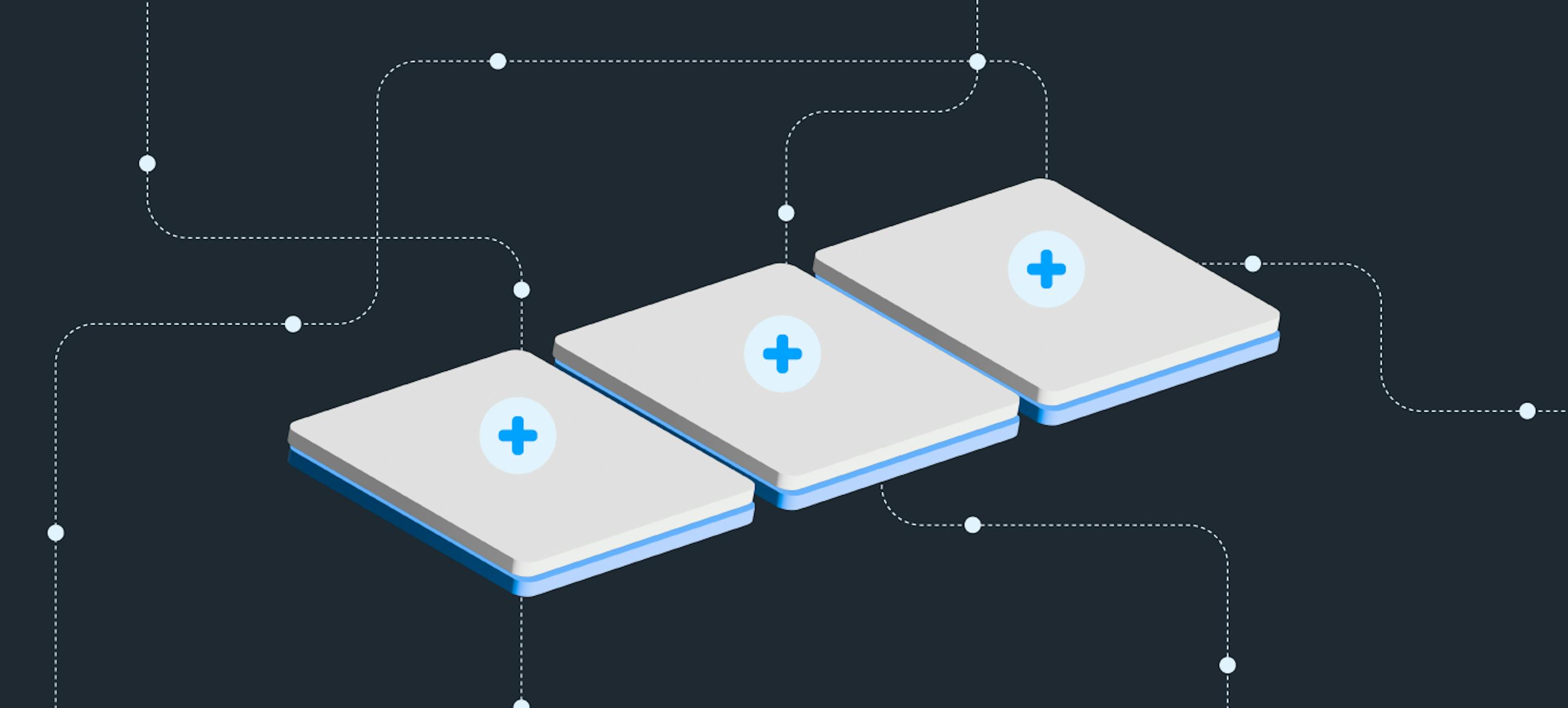
Digital Health Platforms: Benefits, Challenges and 7 Essential Considerations
Introduction
Selecting the appropriate digital health platforms is paramount in the current healthcare industry environment. An effective digital health platform can offer numerous benefits to healthcare professionals and patients, including enhancing care delivery, improving patient outcomes and reducing healthcare costs. Conversely, selecting an unsuitable platform can result in a flawed implementation, security breaches, and other adverse consequences that can harm patients and healthcare organisations.
The ideal digital health solution should seamlessly integrate with existing systems, conform to data security and privacy standards, be scalable, provide a user-friendly experience, possess advanced features, and offer adequate support and training. By selecting the right solution, healthcare organisations can ensure a prosperous, secure, and efficient implementation that benefits all users. Moreover, the COVID-19 pandemic has emphasised the significance of digital health solutions, such as telemedicine, remote monitoring, and virtual consultations. Therefore, healthcare organisations that chose the appropriate digital health solutions were better equipped to provide care during the pandemic and adapt to the evolving healthcare landscape.
Overall, selecting the right digital health platform is crucial for healthcare decision-makers to carefully assess potential venues and choose the one that best caters to their requirements and offers a positive return on investment.
This article will address how to evaluate them by exploring seven consideration keys.
The 7 key considerations to keep in mind when choosing the best digital health platform
When choosing a system, healthcare decision-makers must consider various key factors to select the most appropriate solution for their organisation.
1. System integration
System integration is an essential component of healthcare, as it facilitates efficient, accurate, and real-time access to patient data by healthcare providers. This process involves linking different healthcare systems and applications, such as electronic medical records (EMRs), imaging systems, and laboratory systems, into a cohesive network.
The importance of system integration in healthcare must be considered since when healthcare professionals have access to a patient's complete medical history, they can make informed decisions regarding their patient's care. Ultimately, integrated systems can reduce errors, enhance care coordination, and improve patient safety by providing healthcare professionals with accurate and timely information.
Additionally, system integration can streamline healthcare delivery and alleviate administrative burdens. For example, when a patient is admitted to a hospital, integrated systems can enable healthcare providers to access their EMR, including their medical history and medication lists. This can save time and reduce the risk of errors associated with manual data entry. Besides, system integration can enable healthcare organisations to implement more effective digital health solutions, such as telemedicine and remote patient monitoring. These solutions require seamless integration with existing systems, such as EMRs and patient monitoring systems, to provide real-time data and feedback to healthcare providers.
Integration with hospital management systems also facilitates efficient access to accurate and up-to-date patient data, improving the quality of care they provide. Therefore, when evaluating a digital health platform, decision-makers should carefully check that it can integrate with existing systems. In addition, decision-makers should consider whether the integration process will require significant resources, time, and effort.
Therefore, an efficient digital health platform has to integrate with the existing technology systems seamlessly. Thus, decision-makers should carefully assess the platform's integration capabilities when selecting a digital health solution.
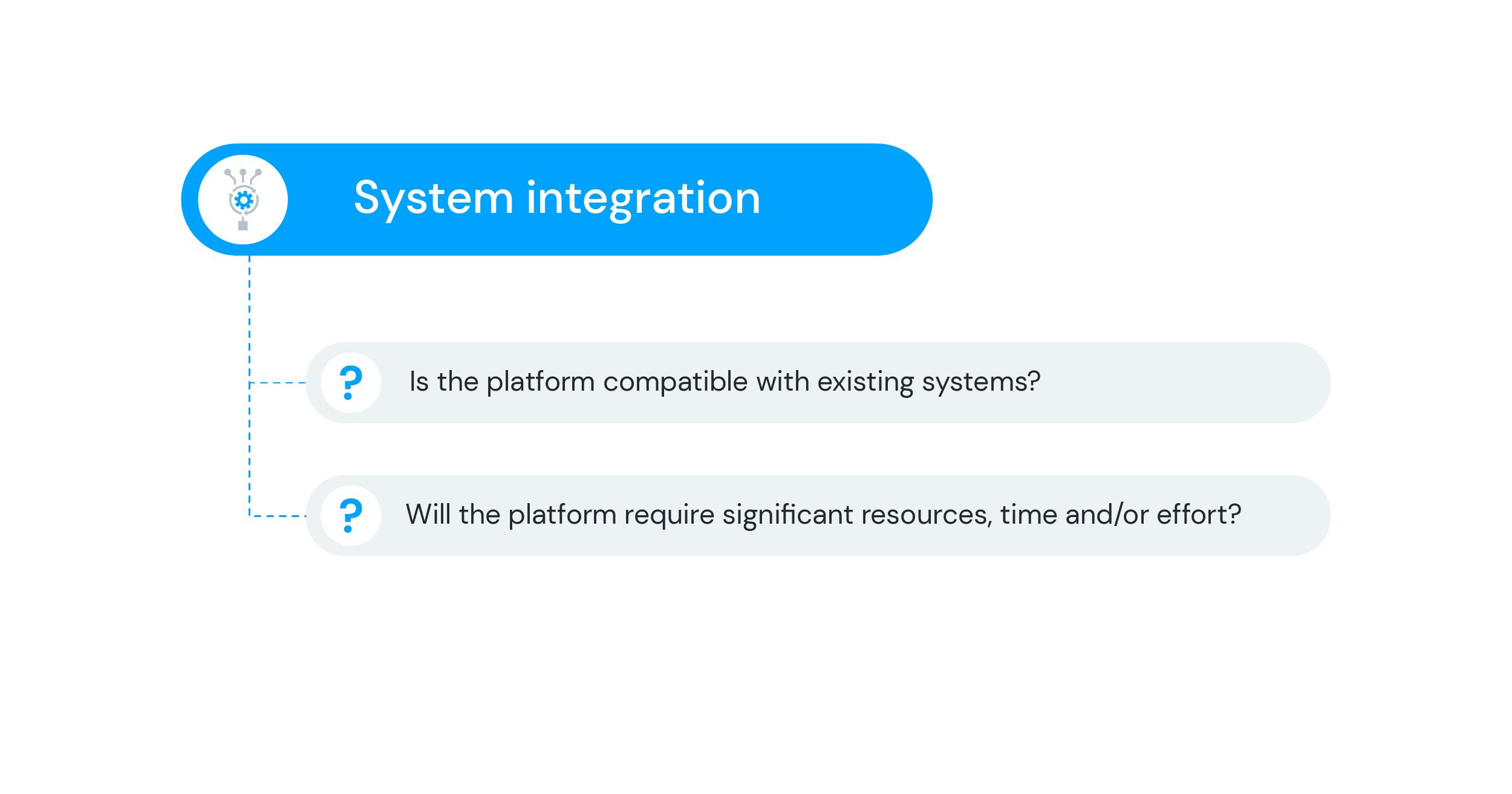
2. Data security
Data security is critical in healthcare as it concerns protecting confidential patient information. The healthcare industry collects, stores and transmits essential sensitive data, including personal identification, medical histories, and insurance information. Ensuring this data's confidentiality, integrity, and availability is necessary to maintain patients' trust and comply with regulatory requirements.
The healthcare industry deals with sensitive and confidential patient information, including personal identification, medical histories, and insurance information. Therefore, the platform must be designed with robust security features and be compliant with regulatory requirements. Due to this, data breaches and security incidents in healthcare can have severe consequences. Not only can they result in the loss of patient trust and damage healthcare organisations' reputations, but they can also mean high financial costs and legal repercussions. Therefore, it's crucial to prioritise data security when selecting and implementing digital health solutions. The platform should be designed with robust security features, such as data encryption, access controls, and authentication mechanisms to prevent unauthorised access to patient data.
To verify that the chosen platform meets security and privacy standards, decision-makers should carefully review the platform's security features and compliance with relevant regulations. This can involve evaluating the platform's encryption protocols, access controls, and authentication mechanisms. Additionally, decision-makers should review the platform's privacy policy and data protection practices to ensure that patient data is collected, processed and stored per regulatory requirements.
Moreover, healthcare organisations should ensure appropriate policies and procedures to manage data security risks, including incident response plans and staff training programs. Regular audits and vulnerability assessments can also help to identify and mitigate potential security threats.
Finally, healthcare organisations should evaluate the platform's track record and security and data protection reputation. They may also consider engaging third-party security experts to perform security audits and vulnerability assessments to identify potential risks or vulnerabilities.
3. Scalability
Scalability is essential when selecting a digital health platform for healthcare organisations since it refers to the platform's ability to grow and evolve with the institution's needs, allowing for the expansion of features and capabilities.
As healthcare organisations experience growth, their digital health needs will also change, meaning that the platform fitted for a small clinic may need to be revised for a larger hospital. Therefore, scalability is crucial to ensure that the platform can meet the changing needs of the healthcare organisation. For example, a hospital or insurance company may need to add new features or functionalities to the platform, such as telemedicine or remote patient monitoring, to improve patient care and engagement. Alternatively, the organisation may also need to increase the platform's capacity to accommodate more patients or healthcare professionals.
Proven scalability avoids the constant switch to new platforms. This can save time and resources while also preventing disruptions to patient care. However, it is essential to note that scalability should not come at the expense of usability, security, or compliance. The right platform should be designed with scalability, meeting regulatory requirements, and providing a seamless user experience.
To choose a scalable platform, healthcare organisations should look for providers that offer flexible pricing and deployment models and customisable options that can be tailored to the institution's specific needs. It is also necessary to consider the platform's architecture and design. A platform designed with modularity and flexibility in mind can better accommodate changes and expansions over time. This may involve selecting a platform built on a scalable infrastructure and using open APIs to allow easy integration with other systems.
In addition, another important consideration is the level of technical support and training the platform provider provides. Decision-makers should look for providers that offer ongoing support and training to ensure that healthcare professionals can make the most of the platform's capabilities.
Ultimately, selecting a scalable platform can help healthcare organisations to future-proof their digital health solutions and ensure they can meet the changing needs of their patients and healthcare professionals. By choosing a platform that can grow and evolve with the institution, healthcare organisations can avoid the need for costly and disruptive system migrations in the future and provide better continuity of care for their patients.
4. User experience
In healthcare, the user experience of a digital health platform is of utmost importance as it can significantly impact the quality of care that patients receive. A positive user experience can increase patient engagement, treatment plan adherence, and overall healthcare service satisfaction.
On the other hand, a poor user experience can lead to frustration and disengagement, which can have negative consequences for patient outcomes.
A good user experience means the digital health platform is easy to use, intuitive, and user-friendly for healthcare professionals and patients. It should provide a clear and concise interface, with easy-to-navigate menus, buttons, and instructions that are easy to understand. Healthcare professionals should be able to access and input patient data easily. In contrast, patients should be able to access their health information and communicate with healthcare professionals seamlessly and intuitively.
Besides that, user experience should also consider different users' specific needs and preferences. For instance, elderly patients may require larger text or more straightforward language, while healthcare professionals may benefit from customisable views or keyboard shortcuts. In addition, the digital health platform should also be accessible to a wide range of users, including those with disabilities or language barriers. The platform should have accessibility features like large fonts, audio instructions and translation services.
By selecting a digital health platform that prioritises user-friendliness, it improves patient engagement and outcomes, reduces errors, increases efficiency, and ultimately provides better healthcare services.
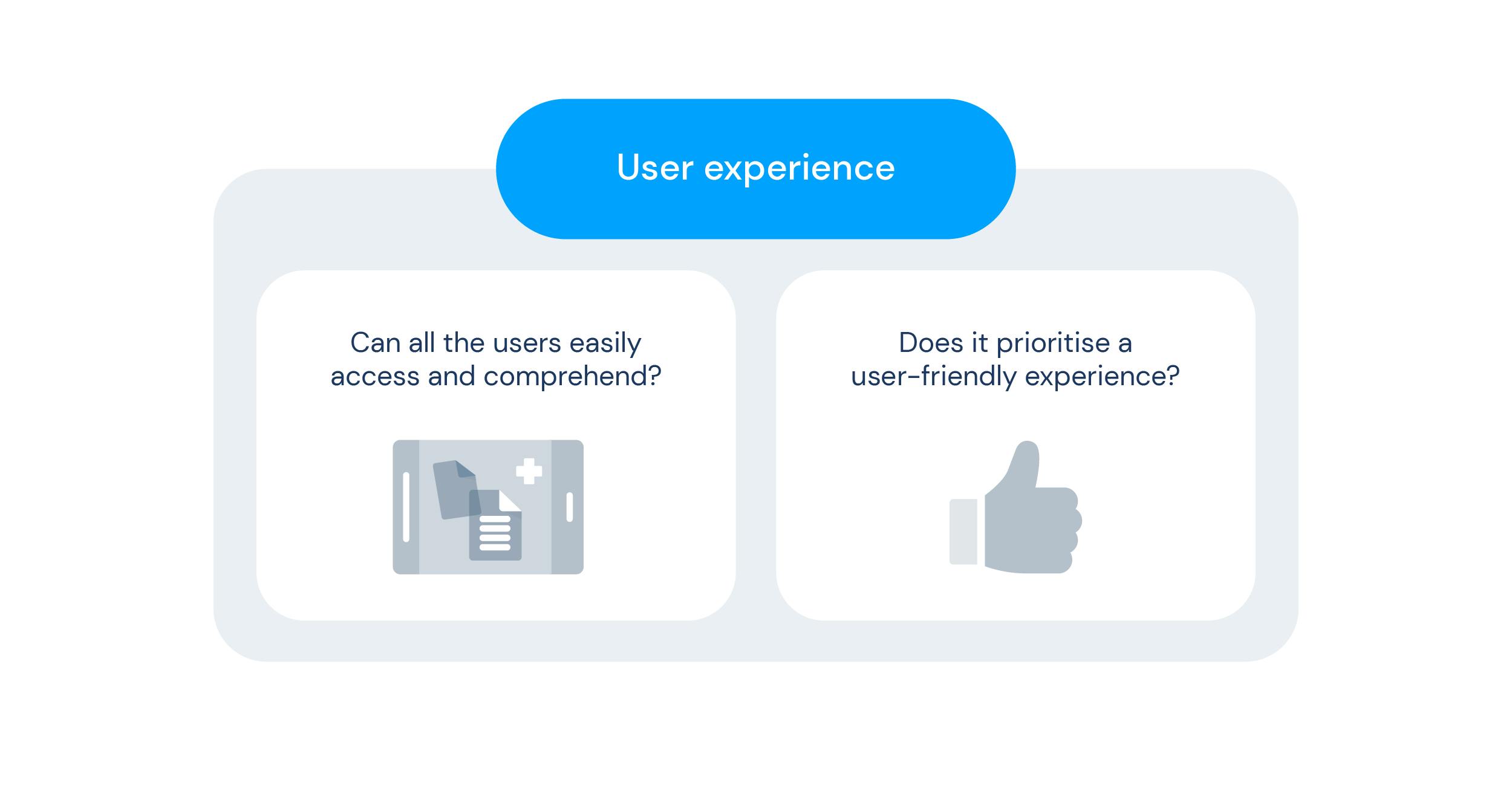
5. Advanced features
Evaluating the features of a digital health platform is crucial to ensure that the solution meets the specific needs and requirements of the healthcare organisation. By carefully assessing the characteristics of a platform, healthcare organisations can select a platform that can improve patient outcomes, increase efficiency, and provide better healthcare services.
Besides seamless integration with existing systems, scalability, data privacy and security and stellar user experience, an ideal healthcare solution will also provide the option of advanced features that, combined with the core platform, transform the service into a complete telehealth suite.
Other features to consider may include telemedicine capabilities, data analytics and reporting, interoperability with other healthcare systems, and accessibility for users with disabilities or language barriers. By evaluating these features and selecting a platform that meets the healthcare organisation's specific needs, healthcare providers can improve the quality of care they provide and ultimately improve patient outcomes.
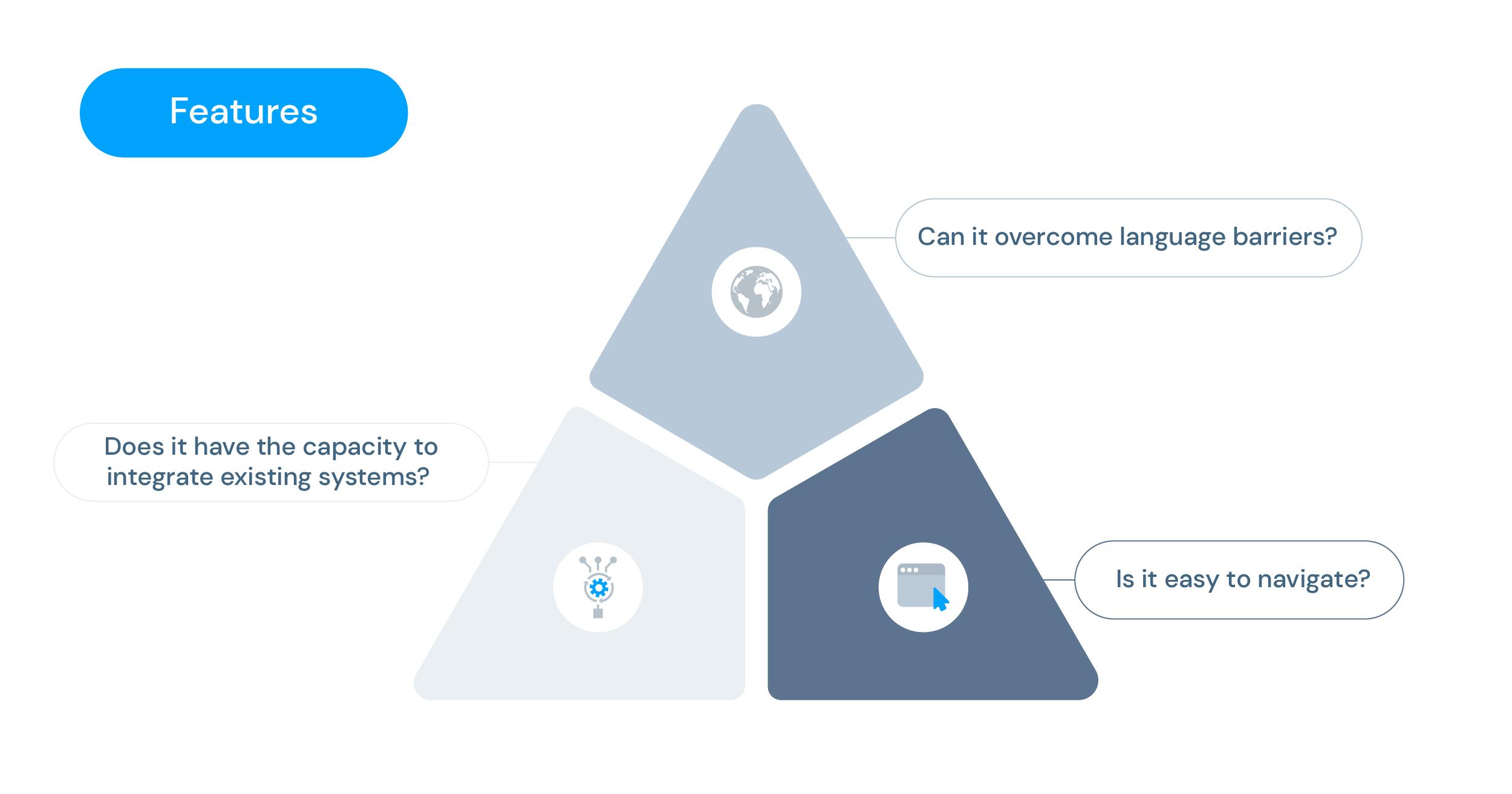
6. Support and training
In healthcare, support and training are essential for ensuring a digital health platform's successful implementation and use. Healthcare professionals and patients must be trained to use the platform effectively to ensure it is used correctly and to its full potential.
Besides, technical support is necessary to address any issues or problems that may arise during the implementation or use of the platform. This includes assisting with troubleshooting, software updates, and any other technical issues that may occur.
Without the proper support and training, healthcare professionals and patients may be unable to use the platform effectively, leading to frustration and disengagement. This can have negative consequences for patient outcomes and the overall effectiveness of healthcare delivery. When selecting a digital health platform, certifying that the supplier company offers adequate technical support and training is crucial.
By ensuring that the supplier company offers adequate support and training, healthcare organisations can increase the chances of successfully implementing and using the digital health platform.
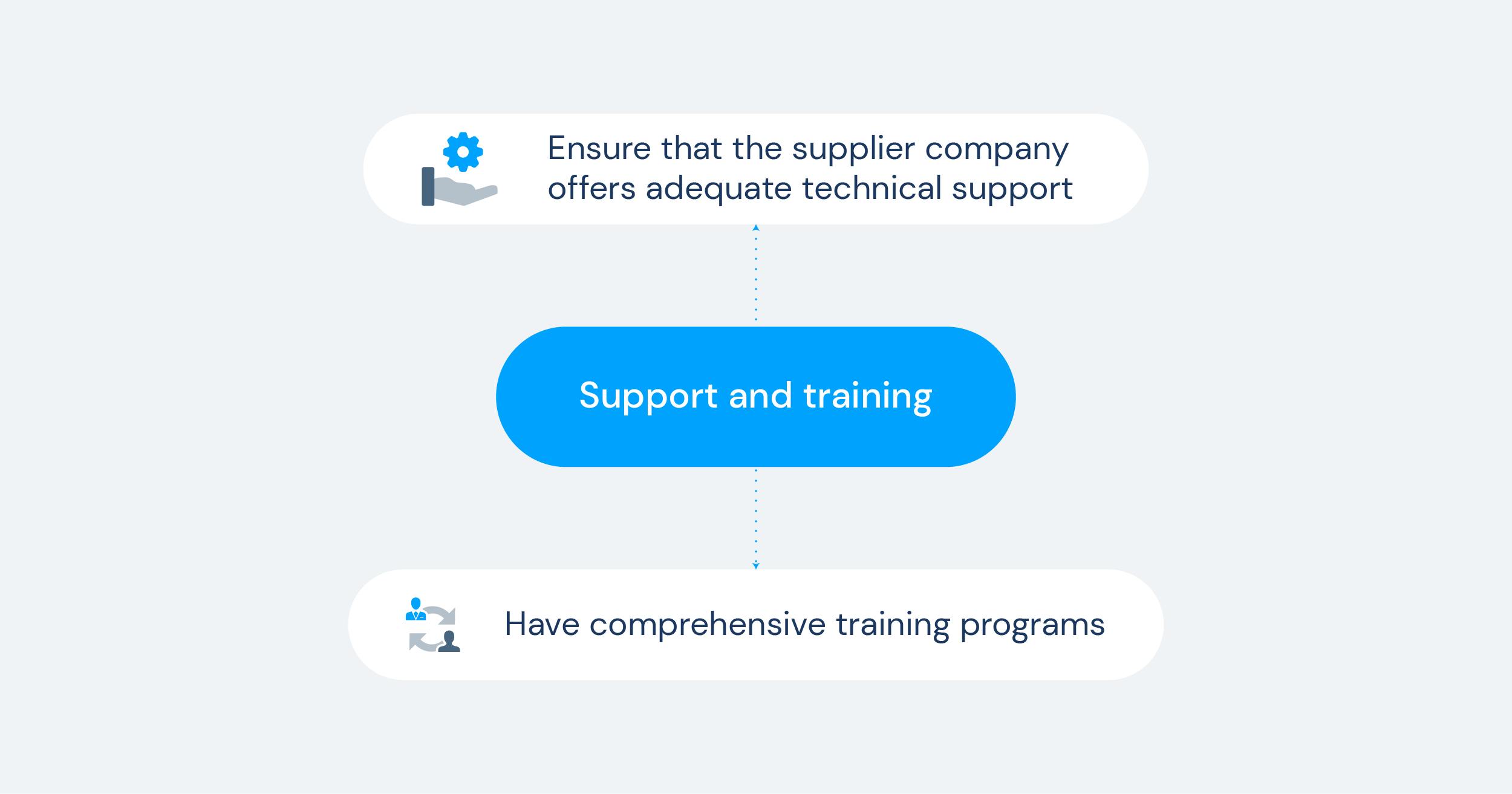
7. Cost-effectiveness
The last key aspect of cost-effectiveness in healthcare is an important consideration when deciding to implement new technologies or services. Cost-effectiveness refers to the balance between the cost of a service or technology and its benefits or impact on patient outcomes. It involves assessing the value of the service or technology concerning its cost.
It is crucial to ensure that healthcare resources are used efficiently and effectively. Cost-effectiveness analysis helps healthcare organisations make informed decisions about which technologies or services to invest in and how to allocate resources to determine whether it is worth the investment by considering the costs and benefits of a service or technology.
When evaluating a digital health platform, it is essential to consider the total costs involved, including deployment, maintenance, and future upgrades. The return on investment (ROI) should also be analysed to determine the cost-effectiveness of the platform. The ROI measures the financial return that is generated from the investment in the platform. In addition to analysing the ROI and total costs, it is also essential to consider the long-term value and sustainability of the platform. Will the platform continue to provide value and benefits over time, or will it become obsolete or require significant upgrades soon? These factors should be taken into account when making decisions about which digital health platform to invest in.
Overall, by analysing the ROI and total costs, healthcare organisations can make informed decisions about the cost-effectiveness of a digital health platform and ensure that healthcare resources are used efficiently and effectively.
The success of a digital health platform
In conclusion, when choosing and evaluating digital health platforms, several key considerations must be considered. These include scalability, user experience, security and privacy standards, support and training, and cost-effectiveness. By carefully evaluating these factors, healthcare organisations can select a digital health platform that meets their needs, improves patient outcomes, and enhances the delivery of healthcare services.
It is crucial to ensure a successful, safe, and efficient implementation of digital health solutions for healthcare professionals and patients. This requires adequate support and training to ensure that all users can effectively use the platform and that any technical issues can be quickly addressed. Additionally, it is essential to prioritise patient safety and privacy throughout the implementation process.
At knok, we understand the success of a truly efficient digital health platform. That’s why make sure that our platform Panacea meets all of the requirements for a modern and innovative telehealth solution. Besides scalability and great user experience, which are must-haves in all of our solutions, we are also ISO 27001 certified, which verifies our commitment with data privacy and security management.
Ultimately, knok is able to offer a complete platform that can integrate with all existing systems and provides a range of toggleable internal apps with innovative functionalities, such as virtual triage with AI, remote vital signs readings and state-of-the-art telemedicine consultations. Finally, we developed Panacea to be able to provide cost-efficiency and optimise operations for all healthcare stakeholders, offering benefits for payors and care providers while also delivering high-quality care for everyone, everywhere.
Sources
- Bolbjerg, Monica. (2022). The 7 key considerations for evaluating digital health platforms. Chef Healthcare Executive. Access on 11th April 2023, Retrieved from: https://www.chiefhealthcareexecutive.com/view/the-7-key-considerations-for-evaluating-digital-health-platforms-monica-bolbjerg
- Office for Health Improvement and Disparities. (2021). Compare different evaluation approaches and choose an appropriate method. Guidance- Choose evaluation methods: evaluating digital health products. Access on 11th April 2023, Retrieved from: https://www.gov.uk/guidance/choose-evaluation-methods-evaluating-digital-health-products
- Marwaha, J. S., Landman, A. B., Brat, G. A., Dunn, T., & Gordon, W. J. (2022). Deploying digital health tools within large, complex health systems: key considerations for adoption and implementation. NPJ digital medicine, 5(1), 13. Retrieved from: https://doi.org/10.1038/s41746-022-00557-1